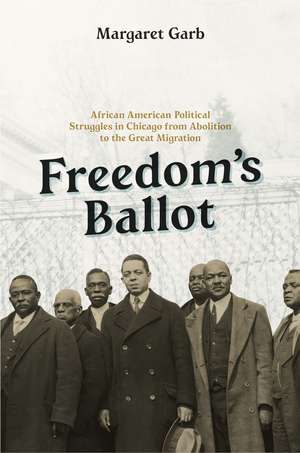Freedom's Ballot: African American Political Struggles in Chicago from Abolition to the Great Migration
Autor Margaret Garben Limba Engleză Hardback – 28 apr 2014
In the spring of 1915, Chicagoans elected the city’s first black alderman, Oscar De Priest. In a city where African Americans made up less than five percent of the voting population, and in a nation that dismissed and denied black political participation, De Priest’s victory was astonishing. It did not, however, surprise the unruly group of black activists who had been working for several decades to win representation on the city council.
Freedom’s Ballot is the history of three generations of African American activists—the ministers, professionals, labor leaders, clubwomen, and entrepreneurs—who transformed twentieth-century urban politics. This is a complex and important story of how black political power was institutionalized in Chicago in the half-century following the Civil War. Margaret Garb explores the social and political fabric of Chicago, revealing how the physical makeup of the city was shaped by both political corruption and racial empowerment—in ways that can still be seen and felt today.
Freedom’s Ballot is the history of three generations of African American activists—the ministers, professionals, labor leaders, clubwomen, and entrepreneurs—who transformed twentieth-century urban politics. This is a complex and important story of how black political power was institutionalized in Chicago in the half-century following the Civil War. Margaret Garb explores the social and political fabric of Chicago, revealing how the physical makeup of the city was shaped by both political corruption and racial empowerment—in ways that can still be seen and felt today.
Preț: 314.02 lei
Preț vechi: 365.43 lei
-14% Nou
Puncte Express: 471
Preț estimativ în valută:
60.12€ • 62.73$ • 50.39£
60.12€ • 62.73$ • 50.39£
Carte indisponibilă temporar
Doresc să fiu notificat când acest titlu va fi disponibil:
Se trimite...
Preluare comenzi: 021 569.72.76
Specificații
ISBN-13: 9780226135908
ISBN-10: 022613590X
Pagini: 304
Ilustrații: 11 halftones, 4 maps
Dimensiuni: 152 x 229 x 28 mm
Greutate: 0.57 kg
Ediția:New.
Editura: University of Chicago Press
Colecția University of Chicago Press
ISBN-10: 022613590X
Pagini: 304
Ilustrații: 11 halftones, 4 maps
Dimensiuni: 152 x 229 x 28 mm
Greutate: 0.57 kg
Ediția:New.
Editura: University of Chicago Press
Colecția University of Chicago Press
Notă biografică
Margaret Garb is associate professor of history at Washington University in St. Louis.
Cuprins
INTRODUCTION / From Party to Race
ONE / History, Memory, and One Man’s Vote
TWO / Setting Agendas, Demanding Rights, and the Black Press
THREE / Women’s Rights, the World’s Fair, and Activists on the National Stage
FOUR / Challenging Urban Space, Organizing Labor
FIVE / Virtue, Vice, and Building the Machine
SIX / Representation and “Race Men”
EPILOGUE / Film, History, and the Birth of a Black Political Culture
Acknowledgments
Appendix 1: African American Political Leaders, 1870–1920
Appendix 2: Election Results for Mayoral and Aldermanic Candidates in the First, Second, and Third Wards, 1900–1920
Notes
Index
ONE / History, Memory, and One Man’s Vote
TWO / Setting Agendas, Demanding Rights, and the Black Press
THREE / Women’s Rights, the World’s Fair, and Activists on the National Stage
FOUR / Challenging Urban Space, Organizing Labor
FIVE / Virtue, Vice, and Building the Machine
SIX / Representation and “Race Men”
EPILOGUE / Film, History, and the Birth of a Black Political Culture
Acknowledgments
Appendix 1: African American Political Leaders, 1870–1920
Appendix 2: Election Results for Mayoral and Aldermanic Candidates in the First, Second, and Third Wards, 1900–1920
Notes
Index
Recenzii
"This is a well-written book. Far too often, historians write primarily for other historians, and jargon and academic-speak can obfuscate rather than illuminate our history. Thanks to Garb's deep research, her lively prose and her narrative virtuosity, her compelling story of African-American pioneers in the ongoing--and unfinished--struggle for civil rights is that rare book that adds something new to our national conversation about race, cities and America, for scholars and general readers alike."
“In this fascinating and original study, Margaret Garb traces the rise of black politics in Chicago from its mid-nineteenth-century origins to the early twentieth century. The book is a signal contribution to our understanding of the long civil rights movement on northern soil.”
“By bringing post-bellum black Northern politics out from beneath the shadows of the South, Freedom's Ballot manages to radically alter the common story of the era of Reconstruction and Jim Crow. For Chicago’s African American leaders, what W.E.B. DuBois called that ‘magnificent drama’ of ex-slaves to bring democracy to America, took on a very different character. As Margaret Garb powerfully demonstrates, uplift ideology and demands for inclusion took a backseat to more militant goals of political power and racial solidarity. Anyone interested in how the Windy City became a national center of black political power must read this book.”
“In a masterful work that reveals the beauty of the historian's craft, Garb illuminates the ways in which politics and the political had multiple meanings for African Americans and their quest for freedom.”
“Garb skillfully traces changes in both the citywide political system and the black response to the emergence of machine politics. . . . Freedom’s Ballot is an important contribution to the growing body of literature on African American political development.”
